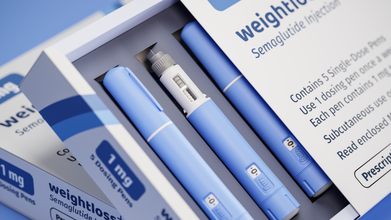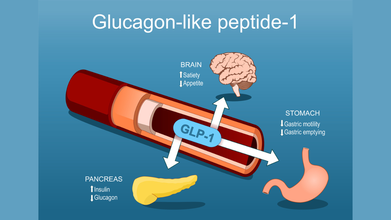- Health Conditions A-Z
- Health & Wellness
- Nutrition
- Fitness
- Health News
- Ayurveda
- Videos
- Medicine A-Z
- Parenting
A Step-By-Step Guide To Choose The Right Rehab For Your Loved One

It gets very challenging when one's beloved goes into a cycle of addiction. We want only the best for our loved ones; therefore, finding the right treatment facility is the key to aiding recovery and facilitating their healing.
Let's dive into the most crucial aspects to consider when choosing rehab for a loved one, helping you make an informed decision to give them the best chance of recovery.
Individualised Treatment Plans
Rehabs should be able to measure every individual's physical, mental, and emotional health so that a course of treatment can be formulated for the individual needs of each patient. This typically covers all involved causes and offers more specific client-centred treatment in a facility, making success rates higher in the long term.
Evidence-Based Therapies
A rehabilitation centre should incorporate evidence-based therapies such as Cognitive Behavioral Therapy, Dialectical Behavior Therapy and Motivational interviewing. The best rehabs blend scientifically validated therapies and complementary treatments. These therapies help assist individuals with discovering negative thought patterns and their remedies, as well as working towards factors that will motivate individuals to remain sober. A good rehabilitation centre would also go about incorporating holistic approaches, such as yoga, meditation, and the healing mantra of sound to heal the body and mind.
Experienced and Certified Staff
A staff who will take care of your loved one will be important in recovery. Thus, make sure that the rehab has licensed, experienced professionals who have a speciality in addiction treatment.
Aftercare and Support Programmes
A good treatment center should have aftercare and relapse prevention programs like follow-up therapy sessions, or even alumni programs. Aftercare services enhance continued guidance and accountability so that people may stay on course as they leave rehab and avoid relapse.
Calming Atmosphere
Getting addicted thrives in noisy circumstances, so peaceful surroundings are important for rehab settings. Nature locations, quiet, whether a seaside, mountain, or greenery, create an environment and a place for individual self-reflection and recovery.
Comfort Amenities
A lot of rehabs offer private rooms, gourmet meals, and fitness spaces that make conditions more comfortable and stressful conditions less of a burden. They can help your loved one feel cared for in their stay and also make the experience more positive in the rehab.
Family Psycho-Education and Support
It is not only the patient who suffers but also the family. Identify rehab centers that provide family psycho-education and counselling programs. Such sessions equip the family with knowledge on addiction, hence enabling families to embrace effective communication and provide better support to their loved ones.
Success Rate and Reviews
One should care about checking up on the success rate and reviews the rehab has. Of immense value is hearing from those who are previously patients or reading online reviews on how effective they have been. Finding the right rehab means finding a treatment facility that provides personal care, professional staff, a supportive environment, and continued support. These factors help your loved one step towards a healthier life free from addiction.
The right rehabilitation, therefore, is essential in building the foundation for your loved one's journey towards full recovery. A rehab offering tailored treatment programs, various forms of therapies, staff who are highly professional, and aftercare when appropriately discharged may be life-saving. Ensure that your loved one feels comfortable, well cared for, and clearly understood throughout the process. Recovery from addiction is difficult so it is necessary to make the right decision in choosing a rehab Center.
Scabies Cases Rise Across The UK This Winter: Know The Early Symptoms

Credits: AI Generated
England is recording higher-than-normal scabies infections this winter. Health authorities have cautioned that the condition, caused by microscopic mites known as Sarcoptes scabiei that tunnel into the skin, spreads quickly through close physical contact and often leads to severe itching and irritation. Data from the Royal College of General Practitioners’ Research and Surveillance Centre shows scabies is circulating more widely than usual in England, with cases increasing through the autumn and winter months.
Also Read: Doctor Explains Why Weight Loss Drugs Like Ozempic Are Truly A Medical Breakthrough
Scabies UK: What Is Scabies?
Scabies is caused by the Sarcoptes scabiei mite. These tiny parasites burrow beneath the skin where they survive, feed and lay eggs. The presence of the mites triggers an allergic reaction in the skin, resulting in an itchy rash. Scabies passes easily from one person to another, particularly among people living in close quarters.
If one member of a household is infected, doctors usually advise checking and treating other family members and close contacts at the same time, according to the Cleveland Clinic.
Scabies UK: What Are The Early Symptoms Of Scabies?
Early signs of scabies include intense itching, which is often worse at night, along with a pimple-like rash, small blisters, and thin, irregular lines on the skin known as burrows. These symptoms commonly appear between the fingers, on the wrists, elbows, armpits, waist and genitals. According to the National Health Service, these reactions occur due to the body’s response to the mites and their eggs beneath the skin.
Symptoms do not usually appear straight away and may take three to six weeks after the initial infection to develop. However, people who have had scabies before may notice symptoms within a few days. Typical signs include severe night-time itching and small bumps, blisters or burrow-like tracks on areas such as the hands, wrists, elbows, nipples, genitals and waist.
In more severe cases, the skin may become thickened, rough and scaly. Among children and older adults, scabies can also affect the scalp, face or the soles of the feet.
Scabies UK: Are There Different Types Of Scabies?
Yes, scabies exists in several forms beyond the classic type. These include:
- Crusted (Norwegian): This form is more likely to affect people with weakened immune systems. It causes thick crusts over large areas of skin and can involve millions of mites, compared with the 10 to 15 mites typically found in classic scabies.
- Nodular: More commonly seen in children, this type affects areas such as the genitals, groin or armpits. Firm, raised lumps may persist even after the mites have been eliminated.
Scabies UK: How Is Scabies Treated?
Scabies is usually treated successfully with prescribed medicated creams and lotions called scabicides, along with careful hygiene measures. To avoid reinfection, clothes, bedding and towels should be washed at high temperatures and tumble-dried or ironed. Items that cannot be washed should be sealed in a bag for at least three days, as the mites cannot survive without contact with human skin.
Professor Michael Marks, a professor of medicine at the London School of Hygiene and Tropical Medicine and former chair of the International Alliance for the Control of Scabies, said the rise in cases may be linked to delays in accessing medical care and gaps in identifying and treating close contacts, which can allow the infection to continue spreading.
Doctor Explains Why Weight Loss Drugs Like Ozempic Are Truly A Medical Breakthrough

Credits: iStock
Ozempic, Mounjaro, Wegovy, and many more such popular weight loss drugs are now making headlines. They are also dominating social media, dinner table conversation and many more. But, is Ozempic truly a medical breakthrough, a miracle drug? Dr Shubham Vatsya, a gastroenterologist, and hepatologist at Fortis Vasant Kunj explains how did this drug change the weight loss struggle that many people face.
Why Is GLP-1 Drug A Medical Breakthrough?
Dr Vatsya explains that it took 20 years of research for scientists to come up with these medicines. This drug underwent proper lengthy trials, and have been approved by the US Food and Drug Administration (FDA), "which is not obtained by giving any bribe".
Also Read: Fact Check: Is Weight Lifting Safe for Teens? An Expert Explains the Risks and Safer Alternatives
He also noted that when a person is not able to lose weight, Ozempic and drugs alike give a "head start" to them, along with a hope.
Talking about side effects, he says that every drug has its side effects, this is where a doctor's role comes in.
"Now, the person who is not able to lose weight, if you tell him 'you hit 100 kg bench press', he will break his shoulder. He needs a kickstart somewhere. This is what weight loss drugs allow," he says.
He also points out that the scientists who made GLP-1 agonists got a Nobel Prize, which "cannot be a scam". This is what makes weight loss drugs truly different.
What Are GLP-1 Drugs?
GLP-1 Drugs stand for Glucagon-like peptide 1, a naturally occurring hormones that helps regulate blood sugar and appetite after eating. It was first identified almost 50 years ago and scientists have since uncovered its role in type 2 diabetes.
Almost two decades of research went behind it that led to the development of GLP-1 agonists. It was in 2005, when the first GLP-1 medication, exenatide was approved.
Read: Could You Become Addicted To Your Weight Loss Drugs?
These medications have three main functions:

- Stimulating the pancreas to release insulin
- Slow the transit of food in the stomach to help people feel fuller for longer after a meal
- Act on areas of the brain that regulates hunger and fullness, leading to smaller portion sizes and reducing cravings
Popular drugs like Ozempic and Wgovy, which have semaglutide, which is a GLP-1 receptor agonist, or tirzepatide found in Zepbound and Mounjaro are FDA-approved for type 2 diabetes and weight loss.
These drugs work by binding GLP-1 receptors in the body, which in return increase insulin production in response to food intake and suppress glucagon, a hormones that raises blood sugar.
Also Read: How Weight Loss Drugs Change Ones Relationship With Food?
Are The Popular Weight Loss Drugs Addictive?
There is currently no data suggesting that GLP-1 medications cause physiological addiction. Interestingly, some research suggests they may even reduce cravings related to alcohol or opioid use. That directly contradicts the idea that these drugs hijack the brain’s reward system in a traditional addictive way.
Still, wanting or feeling unable to stop a medication because of fear of weight regain or loss of control is very real. That experience should not be dismissed, even if it is not addiction in the clinical sense.
These medications are meant to support long-term habit change, not replace it. Nutrition, movement, sleep, and a healthier relationship with food are meant to develop alongside the medication. When people reach their goal weight, doctors may suggest tapering the dose slowly or moving to a lower maintenance schedule rather than stopping abruptly.
Stopping suddenly can make hunger feel overwhelming. A gradual transition allows the body and mind time to adjust. Some people do successfully maintain weight loss without the medication, but it usually requires strong lifestyle foundations first.
Going Through Cough And Flu? NHS Issues Urgent Cough Syrup Warning

Credits: Canva
As cough and flu season sweeps across the UK, health expert Dr Xand shared crucial guidance during today’s episode of BBC Morning Live (Jan 19) for anyone struggling with a stubborn cough. The discussion focused on coughs and colds, highlighting new research showing that human rhinovirus, a common cause of cold, can also trigger pneumonia in adults.
Flu Season In UK: Warning Signs To Watch For
Speaking with presenters Helen Skelton and Gethin Jones, as per Mirror, Dr Xand, a specialist in public and global health, explained which symptoms indicate a cough should not be ignored. He noted that a persistent cough is one of the key signs of pneumonia.
Gethin asked, "A cough happens with many illnesses, so when should someone really worry?" Dr Xand replied, "This is a big question, and plenty of people at home might be thinking, 'Is this serious?' because coughs can linger for a long time."
He continued: "Viruses like respiratory syncytial virus (RSV) can cause what’s known as the 'hundred-day cough,' and people can be coughing for weeks wondering what’s going on."
Dr Xand advised viewers to follow the NHS guidelines for coughs, saying, "The NHS recommends consulting your doctor if a cough persists for over three weeks. Many coughs last three to four weeks, and you’ll usually notice if they’re improving. Right now, the most common cause is a virus."
Dr Xand’s Cough Syrup Alert
Addressing people from home about cough syrups, Dr Xand highlighted the latest NHS guidance. He suggested trying more natural remedies, which can be just as effective. "The NHS does not actually recommend cough syrup," he explained. "It advises hot lemon with honey instead."
The official NHS website confirms that "hot lemon with honey has a similar effect to cough medicines." This simple remedy can soothe the throat, calm irritation, and reduce the cough reflex. Some studies even suggest it works as effectively as certain over-the-counter medicines, particularly for children over one year old. However, it’s important to note that it doesn’t treat the underlying illness.
What Do Cough Syrup Studies Show?
Research shows that most over-the-counter cough medicines offer minimal benefits. Studies, including those from the Cochrane Collaboration, reveal that they perform little better than a placebo for short-term cough relief in both adults and children.
While these syrups may temporarily ease throat irritation or provide a sense of relief, ingredients such as dextromethorphan and guaifenesin often do no better than sugar pills. Much of the perceived benefit comes from the placebo effect or the body’s natural recovery.
Instead, simpler measures like honey, staying hydrated, and using painkillers such as paracetamol or ibuprofen are often more effective. Most coughs caused by colds simply need time to resolve.
Cough Syrup: Red Flags To Watch For
Dr Xand shared the warning signs people should be aware of. "There are several red flags worth noting. High fever, chills, or unexplained shortness of breath are all reasons to see a doctor immediately. You should be able to breathe normally, and if you can’t, that’s a concern."
He added, "Any chest pain with a cough, very thick mucus, or extreme fatigue are also serious signs. More severe warning signals include trouble breathing, bluish lips or fingertips, confusion, mental changes, prolonged high fever, and a rapid heart rate."
"It’s crucial to act quickly," Dr Xand continued. "I’ve seen cases in my own family where someone went from a mild cough to being extremely unwell in just a day. Sudden deterioration can be life-threatening, so early medical help is essential."
Pneumonia Can Be Subtle but Serious
Dr Xand emphasized, "Pneumonia can sometimes develop quietly. It isn’t always dramatic, but it can be fatal. That’s why it’s so important to monitor symptoms and seek medical help promptly if things are getting worse."
© 2024 Bennett, Coleman & Company Limited

